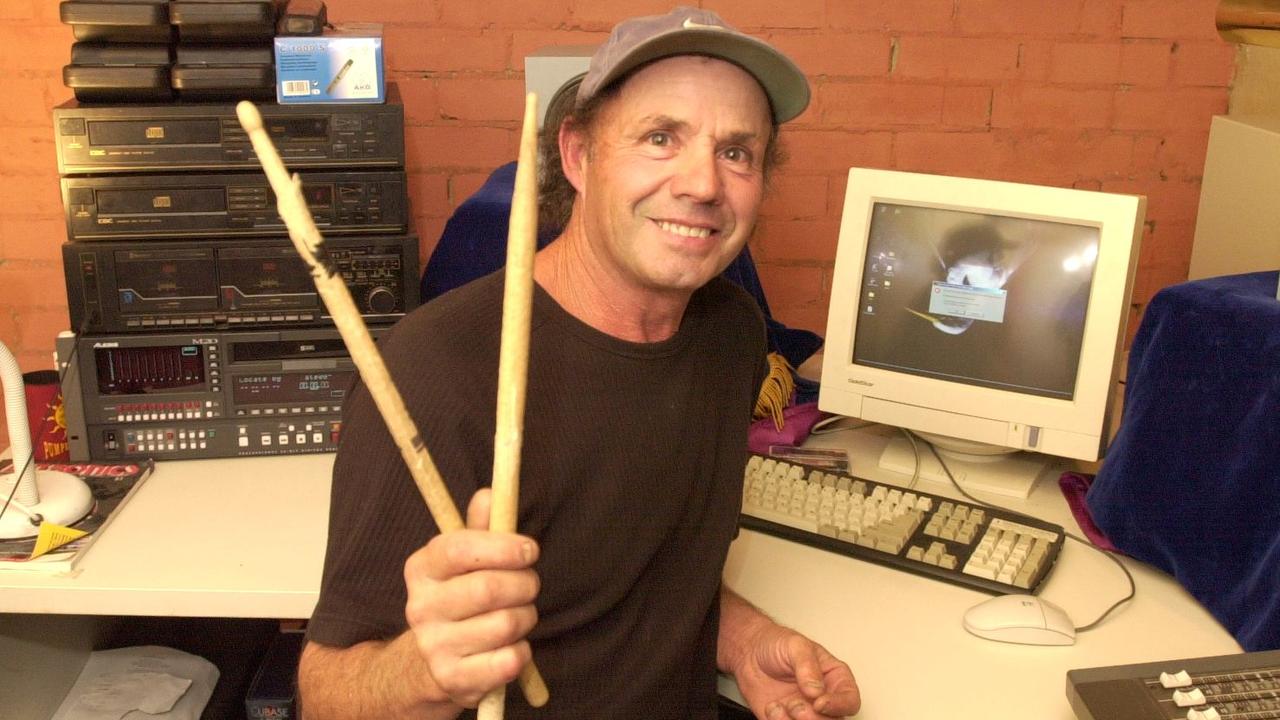Band of Horses frontman Ben Bridwell rides a wave of success
The frontman of Band of Horses has a passion for harmonies and hardcore Americana.

It’s bitterly ironic that Ben Bridwell believes his singing has never been better.
Three nights ago at Sydney Opera House, the Band of Horses frontman hit a wall when his voice — due to some undetermined lurgy — deserted him. He was angry and embarrassed, but with the will of the crowd and a steely determination soldiered on to complete the final performance of the US band’s short Australian visit.
The story was somewhat different a few days earlier as Band of Horses performed at Splendour in the Grass at Byron Bay, in northern NSW. That night Bridwell was in excellent voice and spirits. The band as a whole played with an energy, chemistry and passion that spilled from the stage to the back of the GW McLennan tent, a near-perfect blend of their familiar warm harmonies and hardcore Americana.
Just before they went on, Bridwell, a skinny, tattooed 38-year-old from South Carolina with an endearing southern drawl and a quick-fire mind, gave a shout-out to his impressive pipes.
“I do feel like my pitch has got better and I have more control over my voice than before,” he said. “I used to sound so pinched, almost like Kermit the Frog. Of course it’s easy to pick it apart. It’s surprising, but I do think it has got a bit better.”
The Opera House aside, Band of Horses — Bridwell, guitarist Tyler Ramsey, guitarist-keyboards player Ryan Monroe, bassist Bill Reynolds and drummer Creighton Barrett — is riding a wave of positivity following the release of its fifth album, Why are You OK, last month. The record, produced by Jason Lytle of Americana outfit Grandaddy, has enjoyed better reviews than its predecessor, 2012’s Mirage Rock.
Bridwell, too, sees the new album, his musing on everyday family life and its contrast with the rock ’n’ roll circus, as a return to the band’s core, loose-limbed musical aesthetic. Mirage Rock, produced by revered English veteran Glyn Johns (the Eagles, the Rolling Stones, Bob Dylan, Ryan Adams), took Bridwell into a more structured recording environment than he had been used to when working with Phil Ek on the band’s first three albums.
“Glyn can be domineering,” he says. “I was glad to get back to a bit more sense of self. I wouldn’t change a thing, but I did want to return to something that is a bit more me.”
Certainly there is more of Bridwell on the album in terms of personal experience than before. The songs are about compromise, acceptance and reality. Casual Party is about listening to mindless chatter without getting mad about it, while the rocky In a Drawer is a reflection on his life choices. The conduit to all of it, however, was the second song on the album, Solemn Oath. It came to him after returning from a long tour to his wife and four children.
“I allowed myself to be a bit more confessional in that song,” Bridwell says. “It’s the homecoming song, where you know you’ve been on tour and your ego is boosted a bit, but also there is so much built up in your mind about coming home. In that situation it’s not about being the band guy, it’s about being the best dad ever and best husband. But you get in the door and real life still smacks you in the head.”
Real life began for Bridwell in the small town of Irmo, South Carolina. At 16 he had an epiphany of sorts and moved to Tucson, Arizona. Central to his listening at the time was the album Crooked Rain, Crooked Rain by Californian indie rockers Pavement. It’s the album to which he returns the most.
“I was dropping out of high school,” Bridwell explains. “It was the soundtrack to my leaving home and it still conjures up new inspiration, not just old memories. It’s a watermark.”
A series of odd jobs and a move to Seattle later, Bridwell became the drummer in Carissa’s Wierd, a band he formed with two friends he had met in Tucson. They released three albums, two of them on Bridwell’s Brown Records label, before splitting up. That’s when Bridwell, relatively late in life, switched from drums — and bass — to playing guitar, singing and writing songs. Band of Horses was the result and they released their first album, the Ek-produced Everything All the Time, in 2006.
“He is like a big brother to me,” Bridwell says. “He brought the writer out of me; he brought the singer out of me, even the guitar player out of me.”
The second album, Cease to Begin, followed a year later, but it was the third, 2010’s Infinite Arms, that raised the band’s profile considerably around the world. It was nominated for a Grammy and features songs such as Factory and Laredo that remain staples of the band’s live performances.
Ek left the project before it was completed but is credited as a producer.
Band of Horses has been through several line-up changes since its inception, but central to all of them have been close harmonies, sometimes with a decidedly west coast, almost Eagles richness to them. Bridwell says Ek’s departure perhaps allowed him to indulge his obsession with harmonies a little too much. “Phil left halfway through so there was no one there to referee,” he says. “So I did what I do in my basement, which is basically whack off. I’m looking for something when I do all those harmonies in demo mode, but you forget you have to take some of it out.
“You don’t use up every inch of space. Leave something for the imagination. Give people a chance to hear the other things around it.” That is what Lytle has brought to the latest work, he says.
As he talks, the passion Bridwell has for his work oozes out of him, yet he is modest and even insecure about what he does.
“I don’t come from natural ability,” he says. “I came into it late. I didn’t start playing and writing songs until I was in my late 20s, so I’ve always been behind the eight-ball, I felt.”
He looks assured on stage, however, apart from when he’s losing his voice, but he says confidence is not always a factor. “Sometimes when I’m focused on the mechanics of the song, playing guitar, I don’t have the chance to concentrate on how powerful the words can be,” he says.
Nevertheless, the songwriter has more material waiting to go.
“I have a shitload of songs always,” he says. “It’s just having the right person to help me realise their potential.”
Why are You OK is out through Interscope/Universal.


